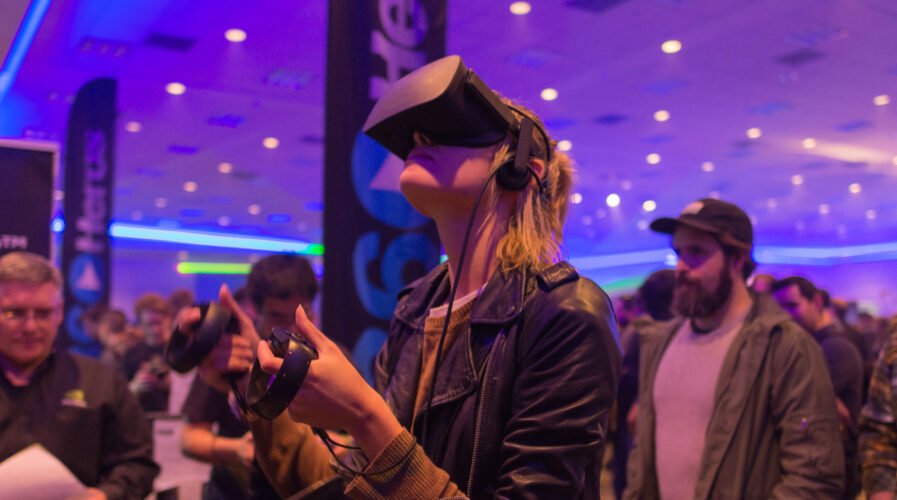

(Source – Shutterstock)
Ever since Meta announced its big plans for the metaverse, several other big tech companies have echoed the move and announced similar investments in the platform as well. While many were skeptical at first about the metaverse, the reality is, that the integrated network of 3D virtual worlds now provides endless possibilities for them.
From a business point of view, a recent report by McKinsey & Company showed that the metaverse has the potential to grow up to a whopping US$5 trillion in value by 2030, with e-commerce the driving force behind it.
What makes the metaverse work is wearables and the use of augmented and virtual reality. As Mark Zuckerberg demonstrated a year ago, the metaverse works best when experienced with VR goggles to provide users the immersive experience decided. Meta has also been researching other wearables like the haptic glove and suit to give users a real experience while being in the metaverse.
Now, this is what the metaverse is supposed to be. Using VR headsets to have an immersive 3D experience in a virtual world. This includes the ability to even purchase products, attend concerts and meetings via customized avatars. The avatars themselves represent a huge market in the metaverse, which is why large fashion brands are also looking at how they can be a part of the experience.
Apart from Meta’s metaverse, Microsoft is also working on something similar after acquiring Activision while NVIDIA is also trying its best to make a mark in the competition.
More recently, ByteDance, the parent company of TikTok has acquired Chinese VR startup PoliQ to cement its foray into the metaverse. According to a report by SCMP, PoliQ, an operator of the once-popular virtual social platform Vyou allows users to create their own avatars. The company was acquired by ByteDance for “tens of millions of yuan”, according to business and trademark registration tracking firm Tianyancha.
Another Chinese tech company, Tencent, has also formed an extended reality division to tap into the metaverse. Reuters reported that the new unit is responsible for creating Tencent’s XR business regarding software and hardware. Earlier this year, there were also reports of Tencent planning to acquire Xiaomi-backed Black Shark, a firm known for its range of gaming smartphones and accessories to boost its impact on the metaverse.
In fact, the state-backed China Computer Industry Association has also formed a metaverse committee amid the country’s growing interest in the concept. Supervised by the Ministry of Industry and Information Technology (MIIT), the Metaverse Industry Professional Committee aims to help members join the new racetrack of the digital economy and to lead the healthy and orderly development of the metaverse industry.
Understanding the real value virtual events
While these big tech companies are investing heavily in technology to perfect their operations in the metaverse, other companies are also riding the metaverse hype but using it more as a marketing gimmick without understanding what the metaverse really is.
The fact is this. The metaverse is a virtual world that a user needs to enjoy with a VR headset. Currently, platforms like Decentraland and the Sandbox work similarly to what the metaverse is. Largely dependent on 3D technology, these platforms together with Meta’s metaverse are reshaping the way people work and do their activities.
Now, while these companies are busy with the real deal, in Southeast Asia, there have been numerous events that claim to be offering a metaverse experience. But in reality, all they are providing is a virtual avenue with basic interaction capabilities for users. VR headsets are not required to access these avenues and users just can attend them from anywhere.
While these virtual events do give a metaverse-like feel to users, they are no where near to providing a fully immersive experience. Users basically just turn on their devices, do not have avatars or are assigned a basic one and have to scroll through the platform, which is often in 2D only.
Tech Wire Asia caught up with an exec from an event company who claimed that a lot of businesses want to host events in the metaverse but unfortunately do not have a full understanding of the concept. For them, the metaverse is merely a virtual platform where people can go and exchange ideas.
Their understanding is not wrong, but business leaders need to understand that there is a lot more that is needed to make the metaverse work, especially with the technology involved to ensure an immersive experience for the users. This includes the ability for a user to create avatars and use them in the metaverse.
With that said, businesses need to realize that there are a lot more details in the metaverse compared to virtual events. Virtual events are a part of the metaverse, representing only a fraction of what it can fully offer to everyone.





